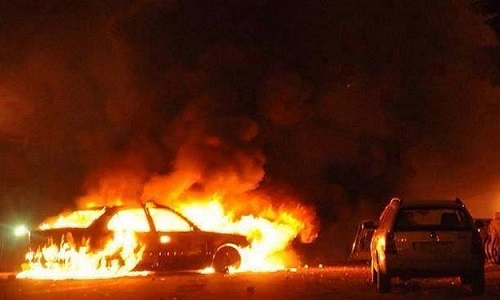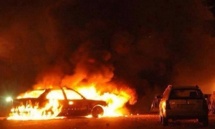"This treacherous act comes as the Libyan army, and particularly the Saiqa special forces unit, is trying to establish security... namely in Benghazi," cradle of the uprising, the government said in statement.
The bombing also wounded three people, leaving two of them in serious condition, and three other people are listing as missing, the statement said, updating an earlier toll.
The suicide bombing left body parts strewn around the area, said police officer Moetez al-Agouri, who was working at the checkpoint but escaped injury.
He said at least seven bodies were immediately identified while others were torn to pieces by the explosion.
A health ministry official told AFP that three bodies were taken to Al-Morj hospital morgue, while the remains of four other people as well as body parts were sent to the Benghazi medical centre.
The checkpoint is located 50 kilometres east of Benghazi, Libya's second city, which has seen a series of deadly attacks in recent months -- mainly targeting security forces and foreign missions -- that have killed more than 300 people.
Security post chief Fraj al-Abdelli, who was wounded in the attack, said his unit had received several threats following the arrest in November of four people who were carrying weapons, explosives, money and a hit-list.
The police convoy transporting the suspects to a Benghazi barracks after their arrest came under attack as it entered the city, he said, with four soldiers killed in that attack and three others wounded.
Libya has been rocked by violence since Kadhafi was toppled and killed in the 2011 uprising, with much of the unrest blamed on former rebels who have resisted appeals by the authorities to integrate into the regular armed forces.
On Friday, the head of military intelligence in Benghazi was shot dead during a visit to his family in nearby Derna.
And a day before, a man was killed in an explosion in his car in Tobruk, in the first attack of its kind in the city close to the border with Egypt.
Also on Thursday, the head of a man who had been kidnapped for ransom was found in Benghazi.
The victim was identified as Attia al-Naili, the 65-year-old father of Saiqa commander Salem al-Naili, whose special forces unit has been involved in deadly clashes with ex-rebels turned jihadists.
In another development reflecting the myriad security problems still plaguing Libya, protesters shut down Internet access in the south and west on Saturday and called on Prime Minister Ali Zeidan to resign.
The knife-wielding protesters stormed the headquarters of Libya's largest telecoms provider and forced an eight-hour shutdown.
The group also condemned the blockade of vital oil terminals in the east by protesters calling for autonomy, LTT communications chief Murad Bilal said.
The months-long blockade has dealt a blow to Libya's economy and slashed oil production from nearly 1.5 million barrels per day to just 250,000.
Oil Minister Abdelbari al-Arusi said in early December that lost production had cost Libya "around $9.0 billion" in revenues.
Zeidan has threatened to use force against the strikers but has yet to follow through.
The prime minister was himself kidnapped by armed men in October and held for several hours before being released, in a humiliating blow to the elected government's efforts to assert its authority.
-----------------------------------------------------------------------------------------------
The bombing also wounded three people, leaving two of them in serious condition, and three other people are listing as missing, the statement said, updating an earlier toll.
The suicide bombing left body parts strewn around the area, said police officer Moetez al-Agouri, who was working at the checkpoint but escaped injury.
He said at least seven bodies were immediately identified while others were torn to pieces by the explosion.
A health ministry official told AFP that three bodies were taken to Al-Morj hospital morgue, while the remains of four other people as well as body parts were sent to the Benghazi medical centre.
The checkpoint is located 50 kilometres east of Benghazi, Libya's second city, which has seen a series of deadly attacks in recent months -- mainly targeting security forces and foreign missions -- that have killed more than 300 people.
Security post chief Fraj al-Abdelli, who was wounded in the attack, said his unit had received several threats following the arrest in November of four people who were carrying weapons, explosives, money and a hit-list.
The police convoy transporting the suspects to a Benghazi barracks after their arrest came under attack as it entered the city, he said, with four soldiers killed in that attack and three others wounded.
Libya has been rocked by violence since Kadhafi was toppled and killed in the 2011 uprising, with much of the unrest blamed on former rebels who have resisted appeals by the authorities to integrate into the regular armed forces.
On Friday, the head of military intelligence in Benghazi was shot dead during a visit to his family in nearby Derna.
And a day before, a man was killed in an explosion in his car in Tobruk, in the first attack of its kind in the city close to the border with Egypt.
Also on Thursday, the head of a man who had been kidnapped for ransom was found in Benghazi.
The victim was identified as Attia al-Naili, the 65-year-old father of Saiqa commander Salem al-Naili, whose special forces unit has been involved in deadly clashes with ex-rebels turned jihadists.
In another development reflecting the myriad security problems still plaguing Libya, protesters shut down Internet access in the south and west on Saturday and called on Prime Minister Ali Zeidan to resign.
The knife-wielding protesters stormed the headquarters of Libya's largest telecoms provider and forced an eight-hour shutdown.
The group also condemned the blockade of vital oil terminals in the east by protesters calling for autonomy, LTT communications chief Murad Bilal said.
The months-long blockade has dealt a blow to Libya's economy and slashed oil production from nearly 1.5 million barrels per day to just 250,000.
Oil Minister Abdelbari al-Arusi said in early December that lost production had cost Libya "around $9.0 billion" in revenues.
Zeidan has threatened to use force against the strikers but has yet to follow through.
The prime minister was himself kidnapped by armed men in October and held for several hours before being released, in a humiliating blow to the elected government's efforts to assert its authority.
-----------------------------------------------------------------------------------------------









 Home
Home Politics
Politics











